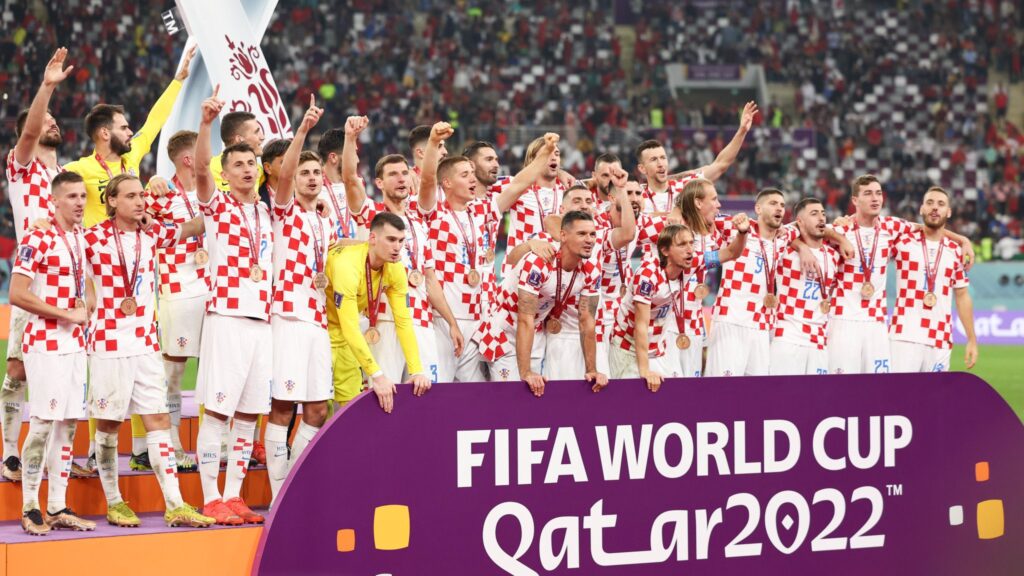Croatia edged Morocco, the only surviving African country, to pick bronze medal at the 2022 FIFA World Cup at Qatar.
The 2018 runners-up after a hard-fought 2-1 win over Morocco for the Bronze chase eliminated the Walid Regragui’s boys in the third place match.
Croatia’s World Cup came to an end with another medal for Luka Modrić as the European side won a bronze medal for their participation in Qatar, four years after Modrić’s side settled for silver after final defeat to France in Russia.
Also read: France end Morocco’s dream to reach World Cup final
The 37-year-old midfielder captained his country as he started his 17th consecutive World Cup fixture, a run dating back across the last three tournaments, taking his total to 19 games in the competition.
The chaos of the game was to be defined by the first 10 minutes, where one of the tournament’s star players, Joško Gvardiol, scored a superb header to give Croatia the lead, only for Achraf Dari to equalise for Morocco with another header less than two minutes later.
What does @lukamodric10 mean to you? ❤️
— FIFA World Cup (@FIFAWorldCup) December 17, 2022
As always, Modrić was the clockwork that kept Croatia ticking over. Alongside former Real Madrid man Mateo Kovacić, they bossed the midfield with a quality in possession that Morocco struggled to cope with.
The presence of the two meant that the Africans could not pursue the approach that had worked so well against Spain and Portugal of isolating the pivot, and were forced to sit back. Instead, Morocco’s strongest moments in the midfield battle came when Youssef En-Nesyri dropped deep into that space to look to try to cut off passing lanes.
Croatia’s midfield duo had to be at their best because of what was in front of them. Seven Moroccan defenders, with the four-man defence and the three-man midfield offering protection, made it hard work to break through to Lovro Majer, Andrej Kramarić, Mirslav Oršić and Marko Livaja.
Before half-time, Croatia found a breakthrough as Kovacić stepped up to prevent Morocco from breaking out of their own third, passing to Livaja who fed to Oršić out wide, and the Dinamo Zagreb man curled the ball in off the far post.
The second period saw Morocco introduce Azzedine Ounahi as more of a direct battle for Modrić and Kovacić, but the Real Madrid man in particular displayed a clear gulf in class.
Ounahi has been one of the unexpected stars to announce themselves to the world in this tournament, but within his first 15 minutes of action, Modrić had already dispossessed him twice and won a foul which saw Ounahi booked.
Keeping possession was the key and his 93% passing accuracy from 67 passes reflected Modrić’s success at controlling that.
Kovacić began to step up more regularly and at times Modrić played as a more conservative sole pivot, operating sensibly and reserving his energy. With the lead in their hands, keeping possession was the key and his 93% passing accuracy from 67 passes reflected his success at controlling that.
The Croatians can then feel hard done by to not have been awarded a penalty as neither Qatari referee Ibrahim Al-Jassim Abdulrahman nor Chilean official Julio Bascuñán on VAR duties adjudged that Amrabat had fouled Gvardiol as he broke through in the box.
Morocco upped the pressure on the Croatian goal, with Sevilla’s En-Nesyri testing Dominik Livaković, but the shot stopped continued his fine World Cup and the Croatians looked calm and composed with Modrić leading by example in the final stages.
Modrić follows in the footsteps of team-mates Eden Hazard and Thibaut Courtois, who finished third in Russia in 2018 with Belgium.
By seeing it out to the final whistle, Modrić follows in the footsteps of team-mates Eden Hazard and Thibaut Courtois, who finished third in Russia in 2018 with Belgium, while its an accolade which in 2010 was won by a young Toni Kroos for Germany before he moved to Spain.
With 23 goals to his name, he has been named Croatia’s player of the year on five different occasions, but is now expected to call time on his international career.

